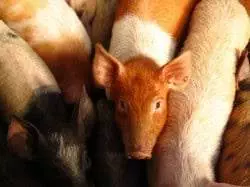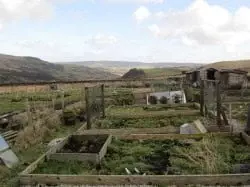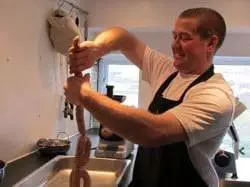
There is a realisation that we have become disassociated from food. From how we grow it, produce and consume it, we are becoming alienated from produce. However, individuals and groups are seeking to address this and educate and reconnect people to the food they consume. One of the groups at the forefront of this movement is a small market town in the West Yorkshire Pennines. Incredible Edible Todmorden has now gained world wide recognition for its varying attempts to educate and stimulate the local populace to grow, eat and appreciate food.
One of the latest ideas is ‘Food Inspirers’ trying new recipes and meeting local food producers. I went along this week to Porcus, a farm high in the hills overlooking Stoodley Pike for some sausage making.
Porcus is a free range, rare breed pig farm. And I get to make sausages out of one of their pigs. Right after I’ve met their relatives, scampering round a muddy field… I’m not vegetarian, but I try not to consume meat frequently, and buy organic or local meat. The point of an activity like this is to highlight to people that if you do choose to buy meat, make sure it’s from a farm where the animals have been happy and cared for, raised outdoors where appropriate, and the meat is subsequently respected and treated to make the most out of it. SJ and Nat are the owners of Porcus, and are passionate about the well being of their animals. Nat is a vet, and there is a menagerie of 3 legged, 1 eyed rescue animals on the farm.
SJ begins with a round the kitchen table talk about the realities of intensive rearing. Whist not being too graphic, she makes no apologies for telling us about the conditions of factory farming, so that we as consumers are informed about the choices. (The squeamish may wish to skip the next paragraph).
Most of our meat currently comes from Poland, where factories are killing pigs at a rate of 6000 per day (that’s not a misplaced zero). Other meat comes from Denmark and The Netherlands. In the former, 75 million animals are slaughtered every year for a population of only 5 million people. These are pigs that are kept in pens, in factories on concrete floors. They will be unable to turn or lie in their pen for the whole of their life, even being inseminated and giving birth in such circumstances. This is the way supermarket meat is so cheap. (Unexpected Tory sympathy alert: It was William Hague who introduced legislation that ensures animals in UK have pens large enough to move about and lie down. This made him massively unpopular, as it meant our meat is now far less competitive in Europe. Go Tory-Boy). For slaughtering, Porcus pigs are coaxed into trailers with food, are taken to a slaughterhouse just 4 miles away, and are accompanied at all times by SJ or Nat, so they are not stressed, and the farmers can check everything is being done correctly.

Fluffy bits now. Porcus is not registered as organic, as they cannot afford the thousands of pounds per year for registration. However, they run their farm in what they describe as ‘the organic way’. This means they have large square meterage for each animal, food given is entirely natural-all meat must be locked away, as an escaped pig will eat anything and if an animal eats meat, they must be removed from the food chain. All medicine is to cure, not for preventative reasons, and again the pig must be removed from the food chain for a set amount of time. The term ‘free range’ is far more wooly, with none of the strict regulations of ‘organic’. Free range animals can be kept in a barn without pens, but still may never see the outdoors.
The 100 pigs are Tamworth (ginger, clever, naughty and wonderful taste), and saddlebacks (excellent mothers, relaxed and glorious). They are now cross breeding the two, so that the motherly instincts of the saddlebacks can be crossed with the glorious meat of the tamworths, without their naughtiness. (There are also goats, turkeys, a host of domestic pets, and we get to meet many of them on our tour of the farm. We just won’t actually be eating any of them). Intensively farmed pigs are reared for 16 weeks, but Porcus rear theirs for 30 weeks. When the pigs are farrowing, and the piglets are born, they are kept in large pens together, as it is too cold so high in the hills to allow them out all the time. Intensely sociable animals, we watched the large piglets playing and chasing each other about in their pens.

Porcus offer an unusual opportunity to become really involved in the production of meat. You are allowed to ‘choose your own pig’ to eat. (It’s pretty much encouraged not to name it, but each to their own on this one!). You can come and see the pig, take photos, watch it roll about in the mud. You can then choose how you want the meat butchered and cured, and if you want, can be involved in the process of butchering. You can even go with your pig to slaughter. You can be taught how to make sausages and then make them to whatever recipes you would like.
After a talk about farming practices, and a very informal, laughter filled question and answer session,we had a tour of the farm, taking in the pens to see the large piglets, and then to the field to see the vast expanse of mud the pigs get to scamper round in. Then it is sausage making time, in a processing room with the best view from a bacon slicer ever. We all had a go at making a standard recipe sausage, with explanations as to what each ingredient does. Group squeamishness over the ox-guts lining, but everyone had a go at feeding the meat through. The day ended with chomping on the sausages we had made, as well as Pancetta, and Scarborough Fair flavours.
You may not agree, or feel comfortable with what I did today. But, if a meat eater went to the sterile supermarket, strolled its blank aisles and picked up the shrink wrapped, water and medicine injected meat on offer without checking it’s provenance, then they are the ones who need to address their consumption. I made sausages today; they came from pigs rolling in the mud just feet away. And they tasted amazing.